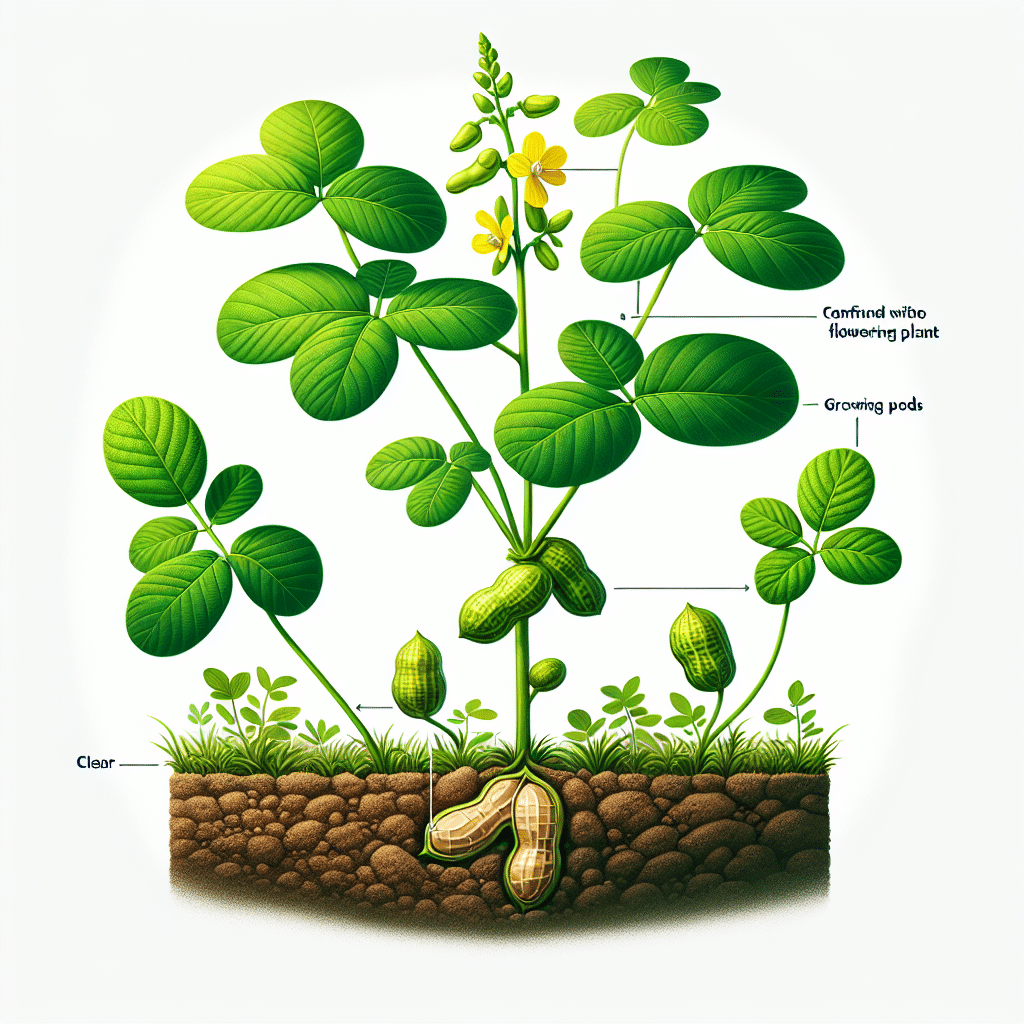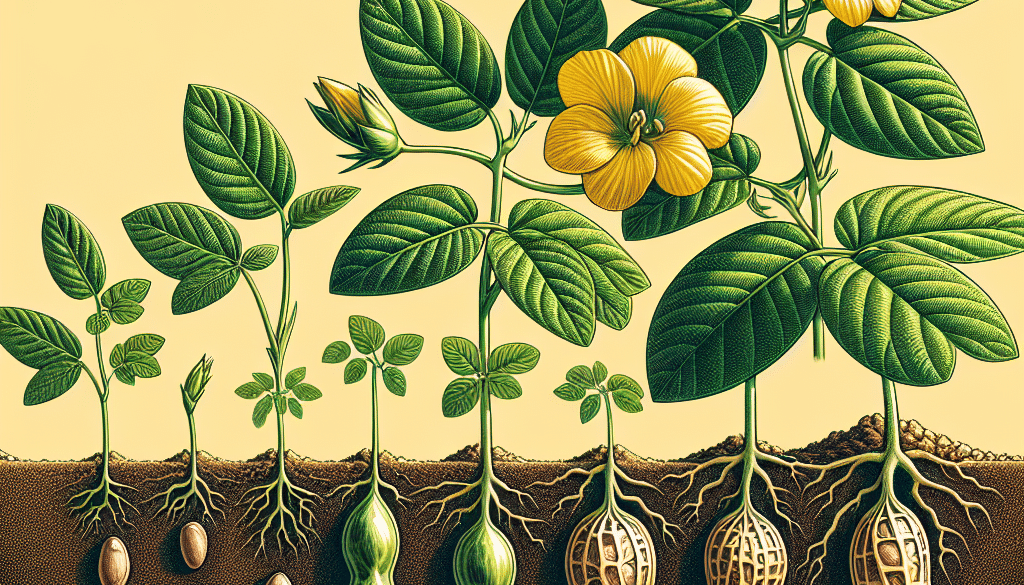Penut Plant: The Source of Nutty Goodness
-
Table of Contents
- Peanut Plant: Unearthing the Nutty Goodness and Health Benefits
- The Origins and Cultivation of the Peanut Plant
- Nutritional Profile of Peanuts
- Health Benefits of Peanuts
- Economic Impact of the Peanut Industry
- Case Studies and Statistics
- Conclusion: Embracing the Nutty Goodness
- Discover ETprotein’s Premium Peanut Protein Products
Peanut Plant: Unearthing the Nutty Goodness and Health Benefits

The peanut plant, known scientifically as Arachis hypogaea, is a legume crop grown primarily for its edible seeds. Revered as a source of nutty goodness, peanuts are not only a popular snack but also a nutritional powerhouse that offers a plethora of health benefits. In this article, we delve into the world of the peanut plant, exploring its origins, cultivation, nutritional profile, and the myriad ways it contributes to our health and economy.
The Origins and Cultivation of the Peanut Plant
The peanut plant has a rich history that dates back thousands of years. Native to South America, peanuts were domesticated as early as 1500 B.C. and have since spread across the globe. Today, they are cultivated in many countries, with China, India, and the United States being the top producers.
Peanuts grow in a fascinating manner. Unlike most plants, after the peanut flowers are pollinated, the flower stalk elongates and bends towards the ground, burying the fertilized ovary underground, where the peanut actually matures. This unique process is known as geocarpy, making peanuts technically legumes rather than true nuts.
Nutritional Profile of Peanuts
Peanuts are a nutritional goldmine, offering a variety of health benefits. Here’s a breakdown of their nutritional content:
- Protein: Peanuts are an excellent source of plant-based protein, essential for muscle repair and growth.
- Healthy Fats: Rich in monounsaturated and polyunsaturated fats, peanuts can help maintain healthy cholesterol levels.
- Fiber: The dietary fiber in peanuts aids in digestion and promotes a feeling of fullness.
- Vitamins and Minerals: Peanuts contain vitamins E and B complex, magnesium, phosphorus, potassium, zinc, and iron, contributing to overall health.
- Antioxidants: Peanuts are high in antioxidants, such as resveratrol, which combat oxidative stress in the body.
Health Benefits of Peanuts
Regular consumption of peanuts has been linked to numerous health benefits, including:
- Heart Health: Peanuts can reduce the risk of heart disease due to their high content of heart-healthy fats, fiber, and antioxidants.
- Weight Management: The protein and fiber in peanuts help in weight management by reducing appetite and calorie intake.
- Diabetes Prevention: Peanuts have a low glycemic index, making them beneficial for blood sugar control and diabetes prevention.
- Reduced Risk of Gallstones: Studies suggest that eating peanuts may lower the risk of gallstones in both men and women.
Economic Impact of the Peanut Industry
The peanut industry plays a significant role in the global economy. Peanuts are not only consumed as a snack but also processed into various products such as peanut butter, oil, flour, and protein powder. The versatility of peanuts makes them a valuable crop for farmers and a staple ingredient in many food industries.
Case Studies and Statistics
Research has consistently highlighted the importance of peanuts in our diet. For instance, a study published in the Journal of the American Medical Association found that consuming peanuts and tree nuts may lead to a lower risk of death from heart disease and other causes. Moreover, the peanut industry contributes billions of dollars to the economies of top-producing countries, providing employment and livelihood to millions of people.
Conclusion: Embracing the Nutty Goodness
In conclusion, the peanut plant is more than just a source of delicious snacks; it’s a nutritional treasure trove that offers significant health benefits and economic value. From its unique cultivation process to its rich nutritional profile and its role in promoting heart health and weight management, peanuts are truly a superfood worth incorporating into our daily diets.
Discover ETprotein’s Premium Peanut Protein Products
If you’re looking to harness the power of peanuts in your diet, ETprotein offers a range of high-quality peanut protein products. Their peanut protein is perfect for those seeking plant-based protein options that are non-GMO and allergen-free. Whether you’re a food manufacturer or a health-conscious consumer, ETprotein’s peanut protein can help you meet your nutritional goals.
About ETprotein:
ETprotein, a reputable protein Chinese factory manufacturer and supplier, is renowned for producing, stocking, exporting, and delivering the highest quality organic bulk vegan protein and plant proteins. They include Organic rice protein, clear rice protein, pea protein, clear pea protein, pumpkin seed protein, sunflower seed protein, mung bean protein, peanut protein etc. Their offerings, characterized by a neutral taste, non-GMO, allergen-free attributes, cater to a diverse range of industries. They serve nutraceutical, pharmaceutical, cosmeceutical, veterinary, as well as food and beverage finished product distributors, traders, and manufacturers across Europe, USA, Canada, Australia, Thailand, Japan, Korea, Brazil, and Chile, among others.
ETprotein specialization includes exporting and delivering tailor-made protein powder and finished nutritional supplements. Their extensive product range covers sectors like Food and Beverage, Sports Nutrition, Weight Management, Dietary Supplements, Health and Wellness Products, and Infant Formula, ensuring comprehensive solutions to meet all your protein needs.
As a trusted company by leading global food and beverage brands and Fortune 500 companies, ETprotein reinforces China’s reputation in the global arena. For more information or to sample their products, please contact them and email sales(at)ETprotein.com today.














